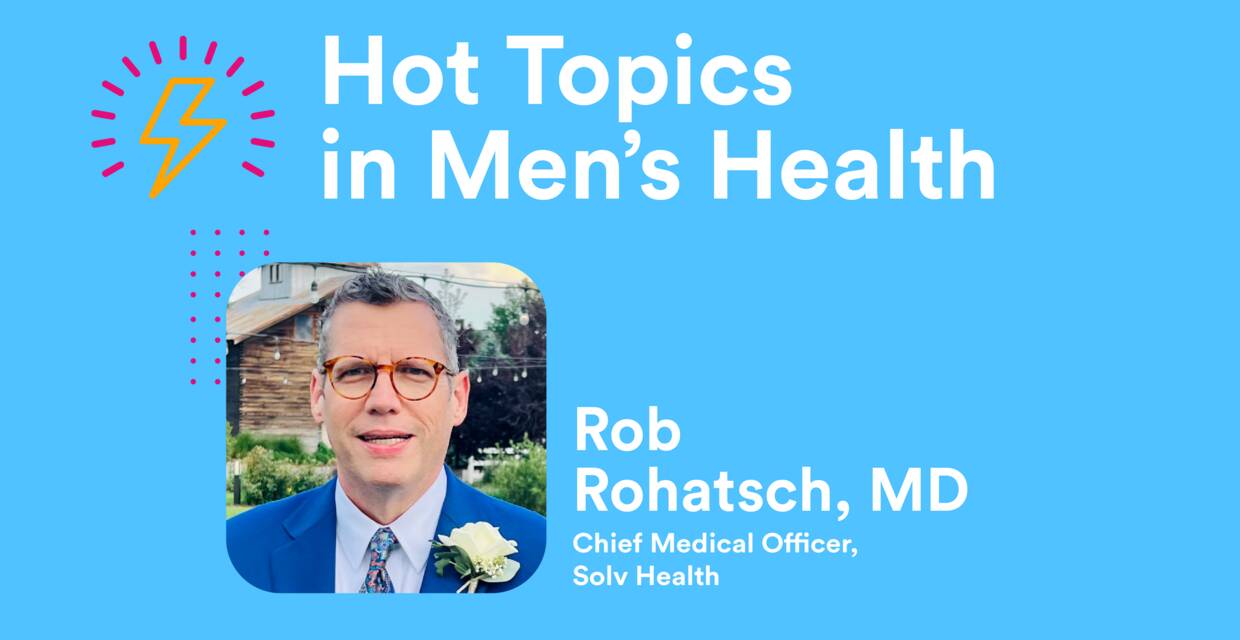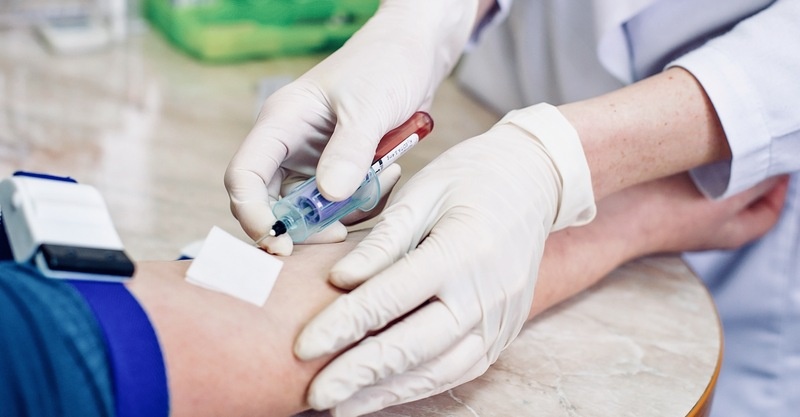Key Points
- Men are more likely to die from preventable health conditions than women, with preventable or treatable diseases being the leading causes of death. It's important for men to pay attention to their health as they age.
- Dr. Rob Rohatsch, M.D., Chief Medical Officer at Solv Health, advises that every man should have an annual physical and get his blood pressure checked every two years between the ages of 18 and 40.
- From the age of 35, men should start getting their cholesterol and diabetes screenings. Sexually active men should also consider annual STI testing.
- For men aged 40 to 65, additional tests such as colorectal screening, lung cancer screening (for those who have smoked), and prostate screening should be considered. After 65, abdominal aortic aneurysm screening is recommended.
- Men are encouraged to take ownership of their health by establishing a relationship with a primary care doctor and undergoing preventive tests. Self-examinations of the skin for changes in spots or moles are also advised as preventive measures against skin cancer.
Men are more likely to die from preventable health conditions than women, according to the World Health Organization. In fact, women are outliving men in all countries—especially in developed nations. Among the leading causes of death for men are preventable or treatable diseases. That’s why we’re sitting down with our Chief Medical Officer, Dr. Rob Rohatsch, M.D. during Men’s Health Month this June. In this interview, we ask Dr. Rob what men need to be thinking about as they age in terms of their health—including some important screenings that are often forgotten.
Solv: Hey Dr. Rob, thanks for chatting with us today! I’d love to start with a short introduction and then we’ll jump into men’s health topics!
Dr. Rob: Hello! I'm Dr. Rob Rohatsch, I’m an emergency medicine physician with a strong background in healthcare operations. I started a small company that offered same-day healthcare services to local communities and grew that company to about a dozen centers. From there I ran a clinic in Southwest Africa for a time, and I am now the Chief Medical Officer with Solv Health, for the past several years.
Solv: Amazing, you have extensive field experience in both urgent care and primary care, so you’re just the person to answer the question—what are the most important things for younger men to know about their health?
Dr. Rob: In general, every man should be seen for an annual physical. In addition to that, there are some things that men should pay attention to—one is blood pressure. Every two years, between the ages of 18 and 40, every man should have his blood pressure checked.
Solv: The CDC reports that heart disease is the leading cause of death among men. You just mentioned blood pressure, but is there anything else men can do to help lower their risk of heart disease?
Dr. Rob: At around the age of 35, you should start getting your cholesterol checked. Cholesterol is a leading contributor to heart disease in our country and getting a handle on it at an early age is very important.
Solv: What other health screenings are important during this time period?
Dr. Rob: Diabetes screenings should start around the age of 35. Of course, as I mentioned before, annual exams are really important and they will do a whole host of blood tests and physical exams to make sure that you remain healthy during those critical ages.
Solv: That’s great! Is there anything that young men often miss or skip getting that they shouldn’t?
Dr. Rob: Yeah, it's really important to consider STI testing. Any man who is sexually active should get an STI testing panel done at least once a year.
Solv: Great! I think that covers it for young guys—what about men over 40?
Dr. Rob: So at age 40 to 65, there are some additional tests that men need to consider. The first one is colorectal screening—it's very important to catch colon cancer early. Also, for anyone who has ever smoked, even just for a moderate period of time in their lives, lung cancer screening at this age is a very good idea.
Solv: Can you tell us more about when to start prostate cancer screenings?
Dr. Rob: Absolutely! A prostate screening exam, at this stage in life, can make sense. But it becomes very important after the age of 40. This is one of those things that needs to be discussed with your primary care doctor—so that your personal risk factors can be considered.
Solv: Are there any screenings you feel are often missed by men as they get older?
Dr. Rob: Yes, after the age of 65, abdominal aortic aneurysm screening should be considered. And you should discuss with your provider whether or not you still need to get a routine colonoscopy.
Solv: How can men be empowered to take control of their health?
Dr. Rob: I think we're all so busy in today's world, but taking the time to go get these preventive tests makes a lot of sense. Men can take ownership of their health by establishing a relationship with a primary care doctor who has their best interest in mind. These tests often don't take very long at all, and many of them can be accomplished with a single visit to a primary care physician.
Solv: That is great advice. One last question—what is something you wish more men would consider when it comes to their health and routine screenings?
Dr. Rob: Self-examinations of the skin, especially if you live in a sunny area, are very important. You want to be on the lookout for any spots or moles that have changed in color, size, or shape. If you notice any of those changes, you need to be seen by your primary care doctor or dermatologist. Also, using good SPF sunscreen and limiting your sun exposure are great preventive measures to avoid skin cancer.
Need to schedule a health screening? Solv can help you find and book visits with top-rated physicians near you.
Frequently asked questions
Why are men more likely to die from preventable health conditions than women?
The World Health Organization has found that men are more likely to die from preventable or treatable diseases, possibly due to a lack of regular health screenings and preventive measures.What are some important health screenings that men often forget?
Men often forget to get regular STI testing if they are sexually active, as well as colorectal and lung cancer screenings as they age, especially if they have a history of smoking.What are the most important things for younger men to know about their health?
Younger men should know the importance of regular check-ups, including blood pressure checks every two years, and starting cholesterol and diabetes screenings around the age of 35.How can men lower their risk of heart disease?
Men can lower their risk of heart disease by getting their cholesterol checked regularly starting around the age of 35, as cholesterol is a leading contributor to heart disease.What health screenings are recommended for men over 40?
Men over 40 should consider getting colorectal and lung cancer screenings, especially if they have a history of smoking. They should also discuss prostate cancer screenings with their primary care doctor.When should men start considering prostate cancer screenings?
Prostate cancer screenings can make sense for men over 40, but it becomes very important after this age. Men should discuss this with their primary care doctor to consider personal risk factors.What are some screenings often missed by men as they get older?
Men often miss getting abdominal aortic aneurysm screenings after the age of 65 and should also discuss with their provider whether they still need to get a routine colonoscopy.How can men take control of their health?
Men can take ownership of their health by establishing a relationship with a primary care doctor and taking the time to get preventive tests. Self-examinations of the skin, using good SPF sunscreen, and limiting sun exposure are also important preventive measures.
Solv has strict sourcing guidelines and relies on peer-reviewed studies, academic research institutions, and medical associations. We avoid using tertiary references.



 LinkedIn
LinkedIn






![7 Reasons to Help Your Loved Ones to Quit Smoking [INFOGRAPHIC]](https://d1kve3ll6vvkpr.cloudfront.net/dir/media/W1siZiIsIjIwMTMvMDkvMDMvMTVfMTRfMDBfMjMwX3RveGljX3RydXRoXzY1MF9zbS5wbmciXSxbInAiLCJ0aHVtYiIsIjgwMHg0MTcjIl0sWyJwIiwiZW5jb2RlIiwianBnIiwiLXF1YWxpdHkgOTUiXV0/file.jpg?basename=7+Reasons+to+Help+Your+Loved+Ones+to+Quit+Smoking+%5BINFOGRAPHIC%5D&sha=ce819e296b7ef542)


